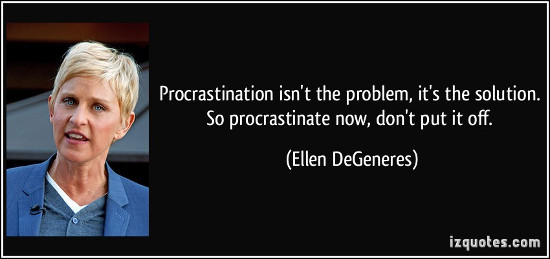Why do today what you can do tomorrow?
I mean, really. Tomorrow is another great day, waiting there for you to do things. Why bother doing everything today?
Existentialists might argue that life won't be there forever, that tomorrow might never come. With that on mind, I'm seriously asking you, if tomorrow you're not alive and kicking, why spend so many hours today, doing the most boring stuff there is on earth? If someone told you you're going to die soon, would it really matter to you to get this paper done, or would you rather going out with some friends?
The truth is, you're always postponing something. It's either work, or pleasure (among other things). Of course work is important and sometimes it can't be postponed, deadlines are over your head. That doesn't mean that pleasure isn't as important as work though. I'm a person that almost always puts work first, but some day I realized work is never finished and I haven't seen my friends for over a month. You're always not doing something, but it is crucial that you decide what you want your life to be about. Can it be all work? Can it be all play? Which one you'll put off today?
These last days, I seem to procrastinate an awful lot. I used to think that procrastination is a very bad thing that should never happen to creative people, to people “who get the work done”. Then again, I thought to myself, I can’t always do my best and that’s actually very ok. No one can be absolutely efficient all the time. That whole procrastination thing used to make me feel a lot of guilt and anger, but somehow, something changed. I don’t perceive it as so bad now. I do a lot of things while procrastinating, I’m not just sitting idly on my bed. But even if I did, it would be all right, it could even be needed in some circumstances. Sometimes I just want to watch “The Mentalist” all night long. There’s some beauty in giving in, too.
I have been reading a lot about procrastination lately. Different authors, different interpretations of the concept of procrastination and the procrastinator. But unless you know the person who procrastinates, you cannot know why he’s doing so. It’s a too general idea to make out some one-fits-all conclusions. To speak for myself, I don’t even procrastinate for the same reasons every time I do it, so how could I speak for another person?
Then I came across John Perry (Professor Emeritus, Stanford University) and his idea of structured procrastination. I let the man speak for his concept and I quote:
All procrastinators put off things they have to do. Structured procrastination is the art of making this bad trait work for you. The key idea is that procrastinating does not mean doing absolutely nothing. Procrastinators seldom do absolutely nothing; they do marginally useful things, like gardening or sharpening pencils or making a diagram of how they will reorganize their files when they get around to it. Why does the procrastinator do these things? Because they are a way of not doing something more important. If all the procrastinator had left to do was to sharpen some pencils, no force on earth could get him do it. However, the procrastinator can be motivated to do difficult, timely and important tasks, as long as these tasks are a way of not doing something more important.
Structured procrastination means shaping the structure of the tasks one has to do in a way that exploits this fact. The list of tasks one has in mind will be ordered by importance. Tasks that seem most urgent and important are on top. But there are also worthwhile tasks to perform lower down on the list. Doing these tasks becomes a way of not doing the things higher up on the list. With this sort of appropriate task structure, the procrastinator becomes a useful citizen. Indeed, the procrastinator can even acquire, as I have, a reputation for getting a lot done.
Structured procrastination. Genius. He also goes as far as to recommend procrastination and he writes:
Non-procrastinators are inevitably ignorant. Suppose you really never put off until tomorrow what you could do today. You'd have to work right up to midnight every night. So you would never be able to watch John Stewart or Stephen Colbert or David Letterman. So you wouldn't know anything about current events and their deeper meanings. That would be irresponsible.
Listen to the man. He is Professor Emeritus of Stanford University. He must know what he’s talking about, right?
You can find more on his concept of structured procrastination here. You can find out his blog entry “Procrastinating Tips: 9 Reasons To Slack Off”, on Huffington Post.

Ellen is always right.